Between March and September 1905, the mailbox of the German scientific journal Annalen der Physik received four studies that would forever change the laws of physics and without a doubt, our concept of reality: of light, matter, time and space. The author was a young man born in Germany on March 14, 1879, who worked in the patent office in Bern (Switzerland) at the time. His career as a physicist was stuck after his doctoral thesis and scientific passion had been relegated to his free time.
The four studies were published that year in Annalen der Physik. The first of them was “Theory of photoelectric effect”, published on June 9th, which would win the Nobel Prize in Physics in 1921. Shortly after, on July 18th, the study “On the movement of small particles suspended in stationary liquids required by the molecular-kinetic theory of heat” was published, mathematically demonstrating that matter is composed of atoms and establishing a new field in physics: statistical physics.
On September 26th, the study “On the electrodynamics of moving bodies” was published. It was a summary of Einstein’s new physics, and of the well-known theory of special relativity – the predecessor of general relativity. In the study, Einstein hypothesized that the speed of light is unchangeable, constant and independent of the observer’s movement. Therefore, with the exception of the constant speed of light, everything is relative, including time, distance and mass.
Finally, on November 21st, “Does the inertia of a body depend upon its energy content?” was published – an overview of all of the previous studies. The mathematical demonstration of specific relativity and therefore, the verification of the equivalence between matter and energy, were condensed into the most famous formula in history: E= mc2.
But Albert Einstein is much more than “the first high-profile scientist in history” as Jürgen Neffe called him in his biography. That’s why we want to explore his life and get to know the most famous scientist in history.
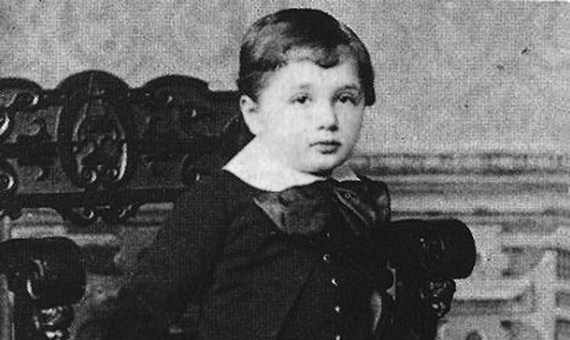
1. It all started with a compass
When his father showed him a compass for the first time, little Einstein was fascinated by how the contraption worked. That moment marked his life forever. Why did the needle point to the same place even when the compass was moved in a different direction? The magic of physics had captivated that little boy. “That experience made a deep and long-lasting impression on me. There must be something deeper behind things”, the physician said years later as he reminisced about that moment. The compass is a symbol of the scientist’s career and history. In fact, there is even a movie in production with this title (“Eintein’s Compass”).

2. Albert Einstein: world citizen
Einstein was a worldly man. He travelled to and lived in different countries (Italy, Switzerland, Belgium, UK…), and he was also granted citizenship in 4 different states over the course of his life. The turbulent political situation in Europe (he left Germany due to Nazism) and his scientific career (he was linked to academic institutions in Prague, Berlin and the US) were the main reasons for moving. He was born a German in the Kingdom of Wurttemberg (present Germany). He renounced his nationality to avoid military service, which is why he lived as a stateless person for five years.
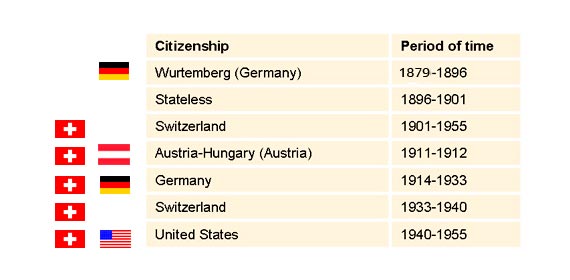
3. Playing the violin was his passion
Einstein inherited his love for music from his mother, Pauline, a talented pianist who insisted on there always being music at home. Music was not only a hobby for the scientist, he used it as therapy in his scientific work. Elsa Einstein, his second wife, explained that “music helps him when he is thinking about his theories”. Besides, in his love of music he also coincided with other greatest physicists of the twentieth century, such as Max Planck and Werner Heisenberg, who were excellent pianists.
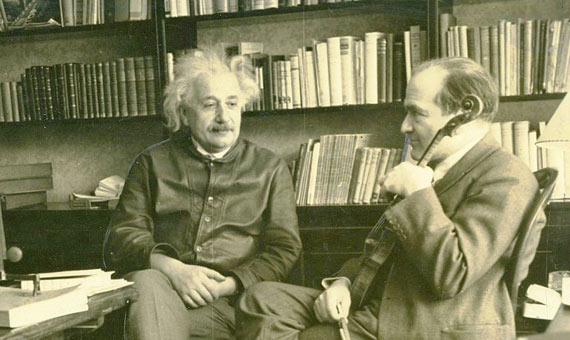
As well as playing the violin since he was 6 and discovering Mozart at the age of 13, Einstein’s links to music went much further. In 1936 he met Bronislaw Huberman, an internationally-acclaimed violinist of Jewish origin who went on to become founder of the Philharmonic Orchestra of Israel. On a fundraising trip to the US, Einstein became his main “partner”.
4. A desperate attempt: Einstein’s darkest deal
It was 1914 and after 11 years together, the marriage between Albert Einstein and Mileva Maric was on the rocks. Knowing that the romantic aspect of his relationship was hopeless, Einstein proposed a strange deal to the lady who was still his wife, with the intention of maintaining a cohabitation subject to certain terms and conditions that would allow them to stay together for the sake of their children. Mileva accepted the conditions, but it was to no avail as a few months later she left Einstein in Berlin and moved to Zurich with her children.
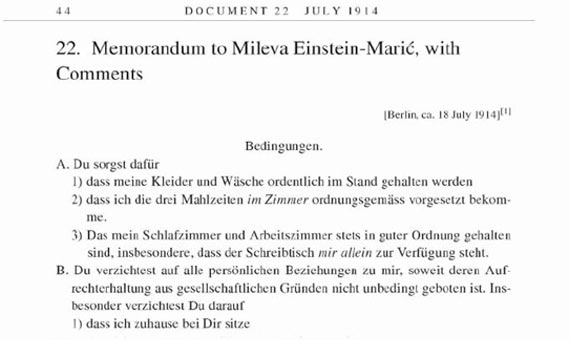
Original letter to Mileva Maric in German / Source: The Collected Papers of Albert Einstein>
5.The father of the atomic bomb: how much truth is there in it?
“I do not consider myself to be the father of the discovery of the atomic bomb”
Albert Einstein, Atomic War or Peace, 1945 / Source: Historical Society of Princeton.
The figure of Einstein is falsely associated with the development of the atomic bomb and nuclear energy. Although his equation E=mc² explains the energy released in an atomic bomb, it does not explain how to make one. The scientist (Swiss at the time) never participated in the project that developed the atomic bomb, Project Manhattan. In fact, in 1940 the US Army Intelligence denied Einstein the necessary security authorization to work on the project. His only involvement was “an isolated action”: sending a letter to the President of the United States, Franklin D. Roosevelt. Einstein knew that German scientists were studying the potential of uranium and nuclear energy and he urged the President to do everything he could to win the battle from the United States before the Germans cracked it.
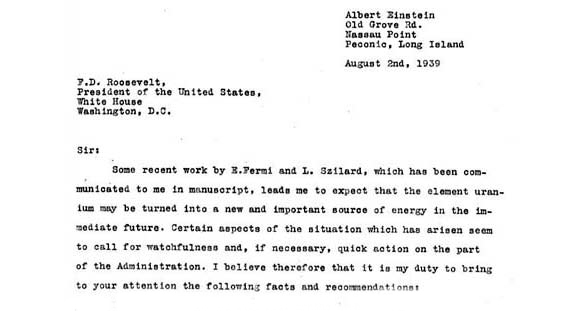
In light of the accusations and reproach over his involvement in the history of the atomic bomb, Einstein always described himself as a pacifist and defended his only isolated action, the letter to Roosevelt, as a desperate measure.
“Had I known that the Germans would not succeed in developing an atomic bomb, I would have done nothing.”
Albert Einstein, Newsweek magazine, Museum of American History.
6. What did Einstein do with his Nobel Prize money?
On November 10, 1922 Einstein found out that he had won a Nobel Prize through a telegram but, to what extent was he surprised? Despite the fact that we was already famous for his Theory of General Relativity, he received the award “for his services to theoretical physics and, in particular, for his discovery of the law of the photoelectric effect“, as the Swedish Academy announced at the time.
The prize awarded to Albert Einstein in 1922 was actually the 1921 Nobel Prize in Physics, which had not been given to anyone that year and thus, it had been reserved until the following year, according to the statutes of the Nobel Foundation. Einstein could not attend to the ceremony in December 1922 because he was on a trip, so he gave his acceptance speech in July 1923.
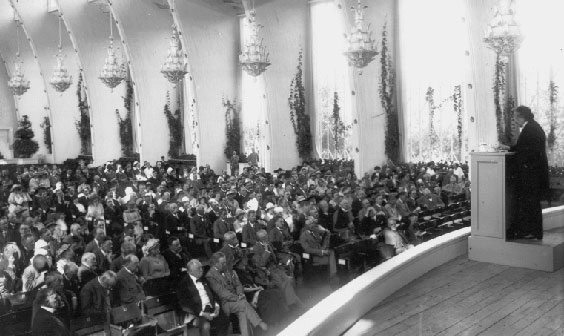
Along with the prize he also received an economic reward of around 120,000 SEK, a sum that represented about 10 times a professor’s annual salary at the time. But Einstein never spent his award money. He gave it all to his former wife, Mileva Maric, as they had decided when they negotiated their divorce agreement, which was signed in 1919. Mileva used it to buy several houses and to look after her children. Why was Einstein so sure that he would receive a Nobel Prize at some point? Why was he so “generous” with Mileva?
7. He didn’t want to become a president
Chaim Weizmann was the first president of the State of Israel until his death in 1952. By then, Einstein was a consolidated scientist famous around the world, a pacifist and a human rights activist, in addition to a professed defender of the Jewish cause. Weizmann and Einstein knew each other and had collaborated at the foundation of the Hebrew University of Jerusalem.
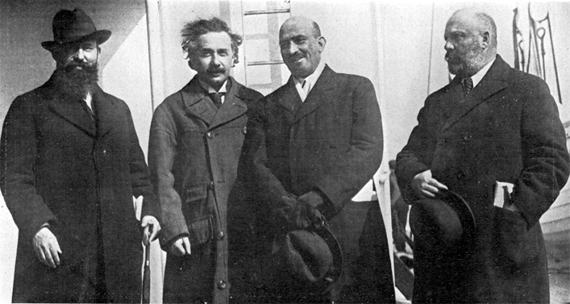
After Weizmann’s death, Einstein received the proposal to become the second president in the history of Israel. Abba Eban, then his country’s ambassador to the United States, conveyed the proposal on behalf of the prime minister (David Ben Gurion) in a letter. Through the same means, the most famous physicist in history rejected the proposal: “All my life I’ve dealt with objective matters; therefore, I lack both natural aptitude and experience to properly deal with people and to perform official functions”. The same document includes one of Einstein’s most personal phrases:
“My relationship with the Jewish people has become my strongest human bond”.
8. Einstein, a Soviet spy?
Einstein never took part in the Manhattan Project, the group of scientists tasked with developing the atomic bomb that would be dropped over Hiroshima (August 6, 1945) and Nagasaki (August 9, 1945). Despite the fact that he himself alerted President Roosevelt of the urgent need to develop the bomb before the Germans did, he was never invited to participate -and we will never know what he would have replied- because Einstein was a risk to national security.
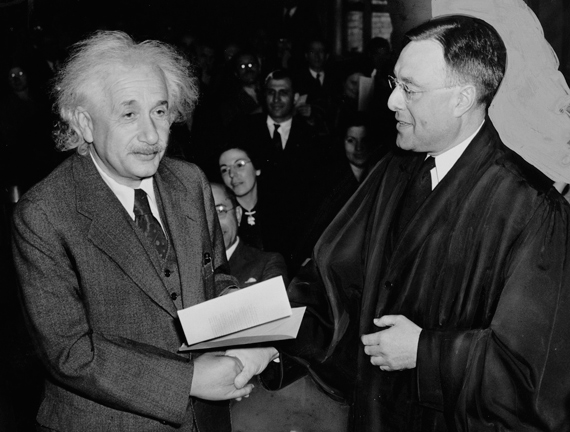
FBI agents followed him for years, and even continued with the investigation after his death. What were they looking for? The scientist was regarded as a security risk by the U.S. intelligence service: this is evidenced by more than 1,400 pages of investigation (they are available on the FBI website). Einstein was a man of the world, he had many contacts and traveled abroad frequently. Moreover, his left-leaning political views, his human rights activism, or his fight against racism made him a target of the “Communist obsession” in the United States at the time.
9. Einstein’s legacy: between New Jersey and Jerusalem

Have you ever considered visiting Einstein’s grave? You wouldn’t be able to do it even if you wanted. Before he died, the physicist made it clear that he didn’t want to be buried, since he was terrified of the idea that his resting place might become a pilgrimage site for admirers and the curious. This is why he was cremated and his ashes were scattered in the United States, near the Delaware river, not far away from Princeton University, where he had developed most of his scientific career. But Einstein’s most important legacy, all his scientific and non-scientific papers, his photographs and the rights to his works, are kept in the Hebrew University of Jerusalem, in the Edmond J. Safra campus. Some of the documents have been digitized and are available to the public.
10. Einstein’s brain traveled around the United States in a bottle
It’s not science fiction. It is not a surprise that the brain of the most famous physicist of the 20th century was a sought-after “good”. Was that the secret behind his intelligence? This is probably what Thomas Stoltz Harvey, the forensic pathologist who oversaw Albert Einstein’s autopsy at Princeton Hospital (New Jersey, 1955), asked himself. He was not a specialist in analyzing brains and he had no authorization to remove it. But he did and for over 40 years he was determined to unveil his secret. He never arrived at a conclusion, although he did send several scientists a sample of the more than 170 slices in which he had divided the genius’s brain. Depressed, probably from remorse, he finally decided to get rid of his prized treasure and thought that Einstein’s brain should be given to his family. He tried to return it to Einstein’s granddaughter, Evelyn, on a trip from New Jersey to California, where she studied. In this unusual journey we was accompanied by writer Michael Paterniti, who described the trip in his book, “Driving Mr. Albert: A Trip Across America with Einstein’s Brain”.

By Dory Gascueña for OpenMind
@dorygascu
Comments on this publication